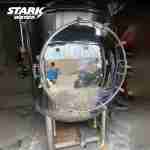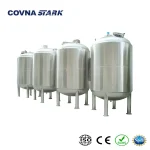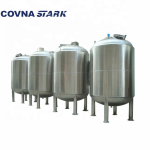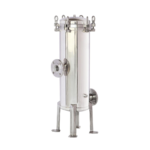Choosing the right filter material can make or break the long-term efficiency of your water treatment system. For industrial buyers and engineering teams in Southeast Asia, especially those operating RO systems or pre-treatment lines, the decision between a stainless steel vs carbon steel mechanical filter is more than a technical one—it's a strategic investment. This article compares the two materials from structural, operational, and economic perspectives to help you make an informed decision.
Understanding Mechanical Filters in Water Treatment
Mechanical filters are designed to remove suspended solids, sediment, and particulate matter from water before it enters more sensitive components such as membranes or resins. They are critical in systems like reverse osmosis (RO), ultrafiltration (UF), and industrial boiler feeds. The housing of these filters—whether stainless steel or carbon steel—directly impacts performance, durability, and compatibility with specific water qualities.
Material Comparison: Stainless Steel vs Carbon Steel
| Parameter | Stainless Steel | Carbon Steel |
|---|---|---|
| Corrosion Resistance | High (ideal for seawater, chemical-rich water) | Low (requires coating; not suitable for corrosive media) |
| Hygiene | Food- and pharma-grade; smooth internal finish | Not suitable for hygienic or sterile systems |
| Durability | 20+ years with minimal maintenance | Shorter lifespan; prone to rust and leakage |
| Maintenance Frequency | Low | High (due to coating reapplication, corrosion) |
| Initial Cost | Higher upfront cost | Lower initial investment |
| Total Ownership Cost | Lower over time | Higher due to frequent repair/replacement |
Application Suitability: Which Material for Which Scenario?
- Stainless filter for RO system: RO membranes are sensitive to fouling and corrosion. Stainless steel is ideal due to its non-leaching nature and resistance to biofilm buildup.
- Carbon steel filters: Better suited for temporary installations or low-corrosive raw water (e.g., rainwater harvesting pre-filters).
- Food & Beverage or Pharmaceutical Industries: Always opt for stainless steel due to hygiene requirements.
- Industrial waste or process water: Carbon steel can be cost-effective if used in well-monitored, neutral pH environments.
Cost Analysis: Is Carbon Steel Really Cheaper?
While carbon steel mechanical filter cost is lower at the purchase stage, long-term operating costs can be significantly higher due to:
- Frequent recoating and maintenance needs
- Downtime during servicing or corrosion failures
- Potential contamination of downstream systems
On the other hand, a stainless steel filter may cost more upfront, but its lifecycle performance—particularly in high-stakes operations—provides better ROI over 5–10 years.
Frequently Asked Questions
Is carbon steel ever recommended for RO systems?
Generally, no—unless it’s used upstream in a low-risk pre-filtration stage with neutral water. Even then, the risk of corrosion makes it a short-term option.
Can I upgrade from carbon steel to stainless steel without changing system layout?
Yes. Most STARK stainless steel mechanical filters are available in standard sizes and flange configurations, making retrofitting easy.
How do I calculate the total cost of ownership?
Factor in: purchase price + maintenance cost + operational downtime cost + replacement cost over 5–10 years. In most industrial settings, stainless steel proves more economical long-term.
Expert Insight: When in Doubt, Choose Durability
In Southeast Asia’s high-humidity, high-salinity environments, stainless steel has proven its value repeatedly across industries. Unless budget constraints are critical and the water source is well-characterized, stainless steel remains the safer and smarter choice.
Conclusion: Stainless Steel or Carbon Steel?
Here’s the takeaway: If your system involves corrosive water, hygiene-critical processes, or long operating cycles—stainless steel is the superior option. For short-term, budget-driven projects with neutral water, carbon steel may suffice but comes with trade-offs.
Need help comparing options for your application? Contact our engineering team for tailored guidance or explore our premium-grade mechanical filters here: STARK Stainless Steel Mechanical Filter.





